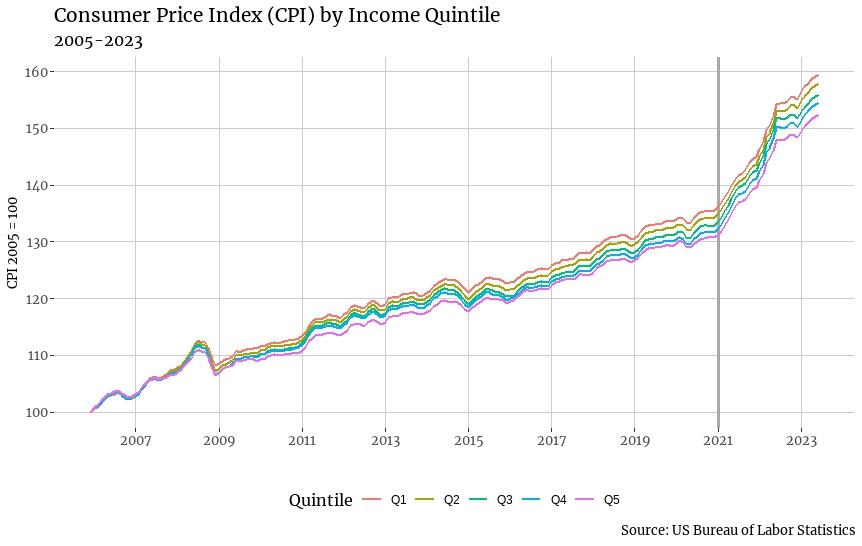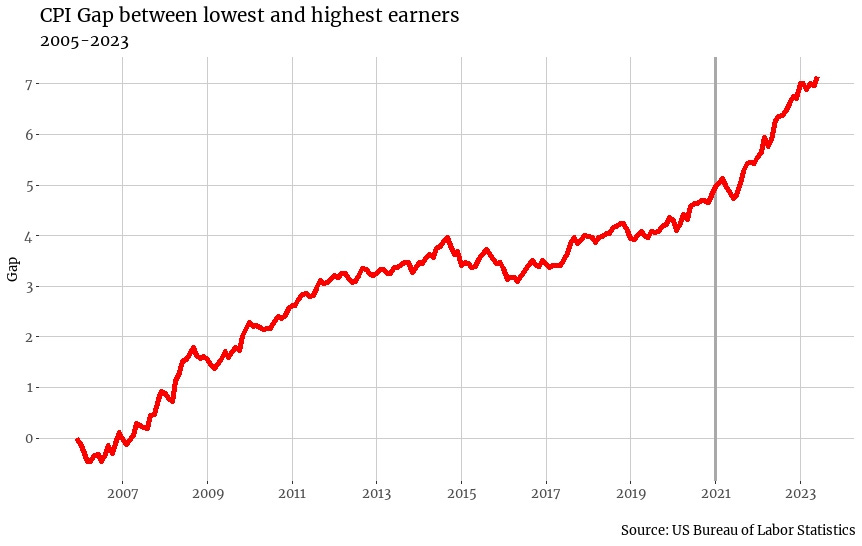Is Biden's Good News actually bad news?
A New York Times columnist defends Biden’s economic policies by claiming inflation is reducing income equality. But is that what Americans really want?
A few weeks ago economist and New York Times columnist Paul Krugman wrote a column chiding Donald Trump for complaining that “America’s terrible airports make us look like third world nation,” though he “hasn’t flown commercial in a very long time.”
And while belittling Trump, the billionaire, for not flying commercial, Krugman used the opportunity to defend President Biden’s economic policies by claiming, apparently with a straight face, that Biden had somehow miraculously reduced the chasm between the rich and the poor. Krugman noted that since 2019 there has been an “unexpected compression” of wage disparities during what he called the “Biden recovery.”
Pardon me, but “Biden recovery?”
“One of the best-established regularities in economics,” writes Krugman, “says that lower-income families spend a higher percentage of their income on food than higher-income families. So does this mean that U.S. economic developments over the past few years have hurt the middle and working classes more than the affluent? Not necessarily, because there’s something else going on.” Seriously Paul?
Yes, Mr. Krugman, the economy is “something else.”
That “something else” according to Krugman is a “striking process of equalization” — as all but the highest wage earners real wages, he writes, have increased while the highest earners real wages have gone down. He then, ironically, relies on inflation data to buttress his claim that the “Biden recovery” has resulted in the “unexpected compression” that helped narrow the gap between the richest and the poorest.
What Krugman, like President Biden, fails to understand is that it’s inflation, not “income inequality,” that has most Americans worried and many struggling. How is compressing the highest earners wages while increasing costs for middle and lower income earners a “recovery?”
In his State of the Union speech, President Biden lectured Americans on Bidenomics. “Folks, I inherited an economy that was on the brink,” the President said, “Now, our economy is literally the envy of the world…Wages keep going up. Inflation keeps coming down.” Envy of the world? The third world…maybe.
Excuse me Mr. President, it’s inflation that’s soaring, not consumer confidence.
That reveals a troubling disconnect between Biden and most of America. “It takes time,” the President said, “but the American people are beginning to feel it. Consumer studies show consumer confidence is soaring.” What’s actually soaring, besides prices, and much to the President’s dismay, are the President’s disapproval ratings.
Most American’s are unhappy with the economy – despite President Biden continually trying to convince us otherwise. According to a recent Gallup poll, 61% of Americans disapprove of the way President Biden is handling the economy. The Pew Research Center reports that “Majorities of U.S. adults say they are very concerned about the price of food and consumer goods (72%) and the cost of housing (64%).” According to Gallup, the President’s approval rating has “edged down” to 38%.
While Biden boasts that inflation “has dropped from 9 percent to 3 percent,” the President, and Krugman, conveniently ignore one ugly truth about inflation – it’s cumulative. It’s simple math – math even a President (and a New York Times columnist) should understand. Nine plus three equals twelve — even in the White House and at the New York Times. A 12% increase in prices in two years is nearly unprecedented – and those kinds of increases haven’t been seen since the “Carter malaise” of the late 1970’s.
The “Good News” bears a closer look.
A closer look at the inflation data belies Krugman’s, and the President’s, conclusions about the “Biden recovery.” The inflation gap, in real dollars, between the poorest and richest Americans has actually INCREASED during Biden’s presidency. In fact, the gap widened as much in the three years since Biden has taken office than from all of 2010 until 2021.
Krugman’s defense of the President’s economic policies rests on the absurd claim that the percentage difference in the “inflation gap” between the highest (18% inflation increase) and lowest earners (19.5% increase) has shrunk to 1.5% from December 2019 to June 2023. President Biden assumed office in January 2021.

Krugman spins the bad news on its head – arguing that while inflation has increased almost 20% for the poorest Americans since he took office – it’s actually evidence of a “remarkably equalizing economic recovery.” Try telling that with a straight fact to people who are spending more and more of their income to buy groceries, heat their homes, or put gas in their cars.
What’s actually truly remarkable is that both Krugman – and Biden – see this as good news. It’s likely been a long time since Biden — and maybe Krugman — shopped in a grocery store or had to worry about the price of groceries. Maybe once upon a time the President was a “Regular Joe,” but that was a long time ago. After decades at the highest levels of political power he has become increasingly disconnected from the worries the average American — and increasingly connected to elitist concerns like “income inequality.” That IS NOT good news.



